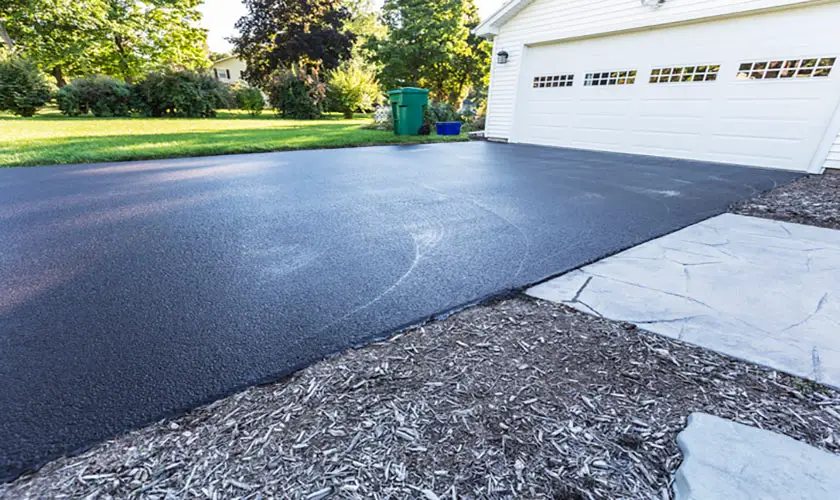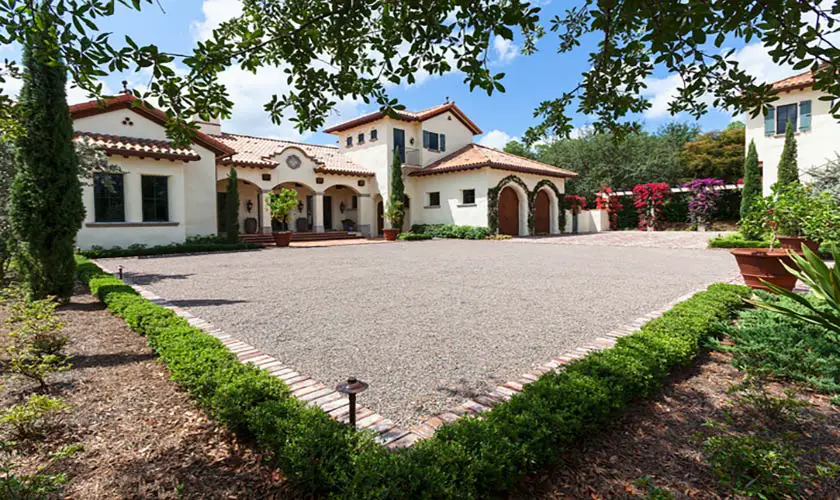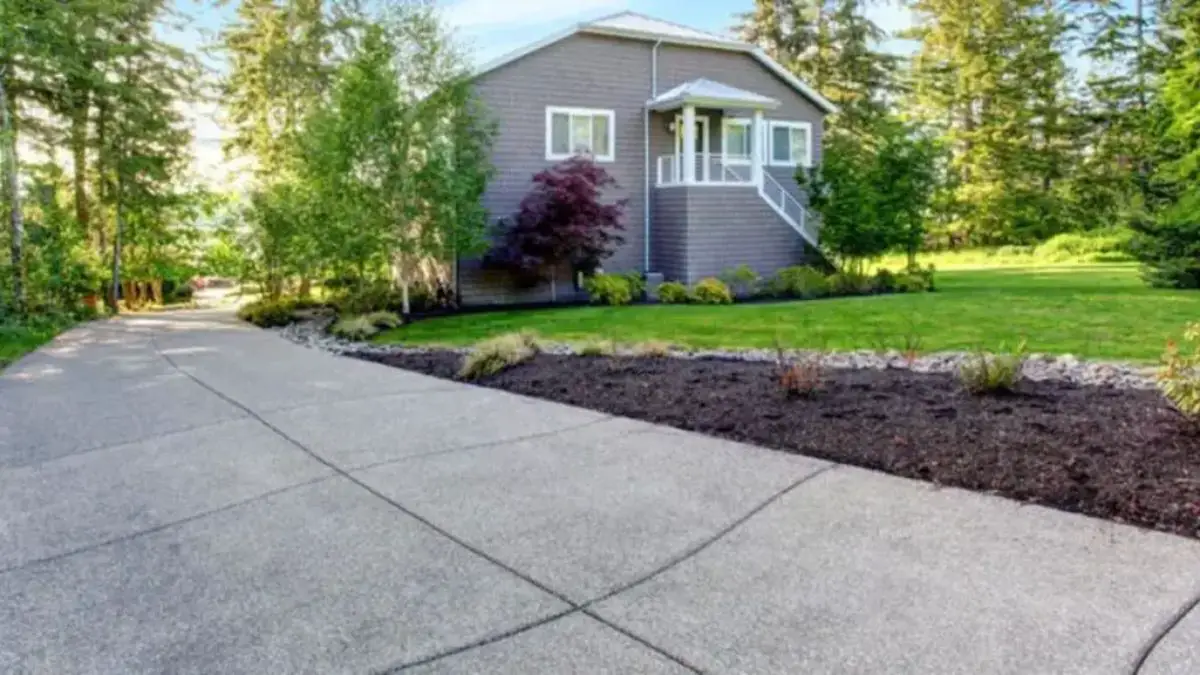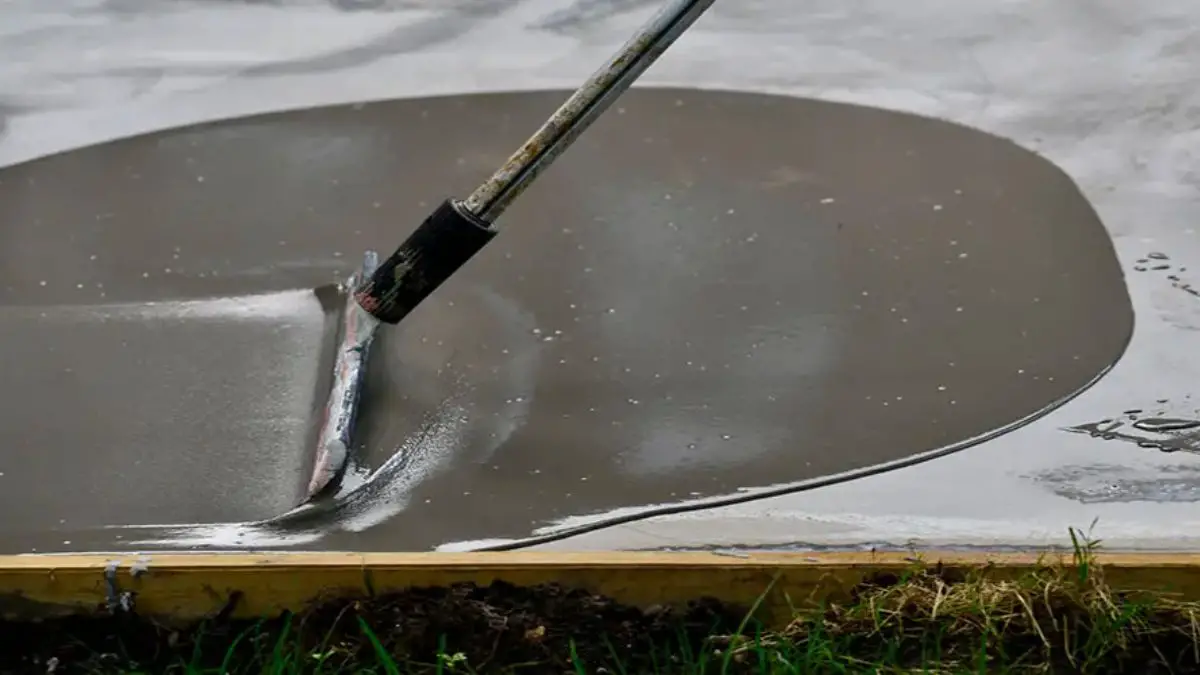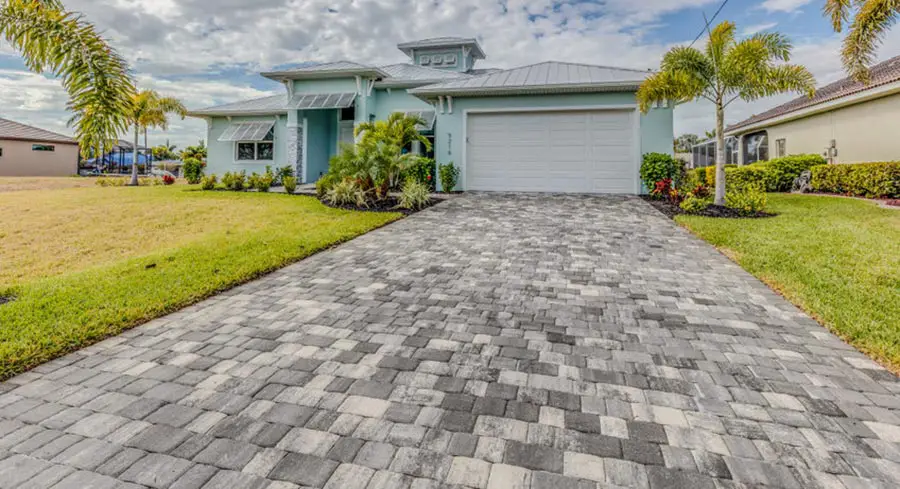
Are you considering transforming your patio, driveway, or walkway? In recent years, more options are available. For example, you can use either poured concrete or pavers.
It’s not uncommon to find driveways, patios, and walkways made of poured concrete, stamped concrete, or pavers. While the two materials are common, they differ in installation, maintenance, and repair costs.
Concrete typically costs about $125 per yard. Smooth poured concrete costs between $4 to $6 per square foot, depending on the thickness of the pour. For specialized finishes such as borders, colored, and stamped concrete, you can expect to pay $8 to $18 per square foot, depending on complexity. The material cost to concrete and brick pavers doesn’t vary much; however, the installation costs do. Pavers will cost $8 to $25 per square foot, with up to 70% of this installation cost.
Let’s crunch the numbers on which costs less between asphalt or concrete driveway.
| Concrete Cost Per Square Foot | Paver Cost Per Square Foot | |
|---|---|---|
| Material | $3 to $5 | $4 to $8 |
| Gravel/Grading | $1 to $2 | $1 to $2 |
| Labor | $2 to $10 | $3 to $15 |
| Total: | $6 to $18 | $8 to $25 |
Prices are estimates and will vary by location. Prices exclude specialty designs and finishes.
Is poured concrete cheaper than pavers? Yes, it is. While pavers are a cheap material, the cost of installation is higher. There’s lots of work that goes into installing pavers correctly to avoid repeating the job.
Luckily, you can pick the kind you want to use. Still, it’s worth taking the time to understand the two materials before delving further into costs.
What is Concrete?
Most construction sights use concrete as one of the leading materials in different structures. But, what is concrete?
Concrete is a mix of rock material and a bonding agent. Most people choose cement or asphalt as the binder. As a result, it’s a common sight to find concrete as one of the primary construction materials on a building site.
It’s a material that has been around for centuries and continues to benefit many people to date. However, when you want to produce it, you have to mix an aggregate material like sand, water, and cement.
Since some structures are enormous, the mixing process can take a long time. That’s why you can opt to order ready-made concrete to use at the site. In addition, there are numerous mixing plants available today around the world.
However, while concrete is popular, it’s not the only flooring option. You can choose to use pavers.
What Are Pavers?
Pavers are paving stones made of asphalt, concrete, or a mixture of the two. Some even use wood, tiles, and flagstone. You can choose between the most common, which are concrete and stone pavers.
Pavers are a great way of transforming flooring, especially on the patio or driveway. Not only is there a possibility of creating different designs, but you can also choose various colors.
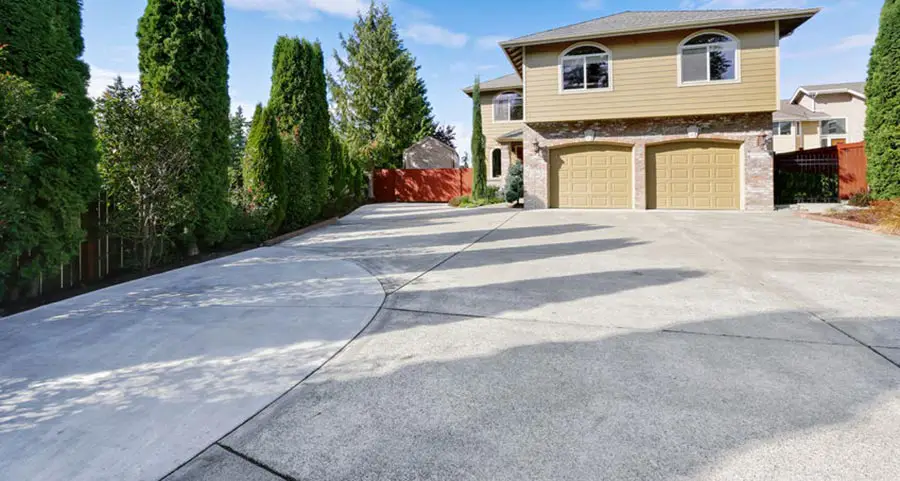
Is Poured Concrete Cheaper than Pavers?
A basic smooth finish concrete installation will always be cheaper than pavers because installation is quick and not as labor-intensive. However, stamped concrete stained to look like natural stone can match or exceed the cost of pavers. In these instances, pavers may be cheaper than concrete.
Before you begin any project at home, you need to take a moment. Concrete and pavers are both great ways of transforming specific spaces in your home.
There’s a difference in the various kinds of paving materials when you compare them to concrete. However, they differ when it comes to costs. Therefore, it would be best if you considered the installation and maintenance costs.
Most people prefer to use paving stones or concrete slabs for this task. However, some pros and cons are associated with the two methods. Therefore, it’s good to keep them in mind, which helps you complete the project in a timely and satisfying manner.
Size is one crucial factor you should consider. While concrete slabs can be as small or broad as you want, pavers are limited in terms of size. Often you get small pavers that you interlock into a more extensive section. However, you can get pavers in various colors while painting concrete to get color variation.
Considering these differences can be an eye-opener and help you choose the right one to use. But, the bottom line remains the cost. Which is cheaper to use in the short and long-run? For example, poured concrete is more affordable to install than pavers.
Comparing Concrete Vs. Pavers Costs
Installing Concrete Slabs
Concrete slabs are pretty standard in many driveways and patios across the country. Most people tend to turn to concrete because it’s readily available and serves the desired purpose. However, there are many benefits associated with concrete that you can look into before using it.
Concrete is Durable
Concrete works in any and every environment. It’s durable and doesn’t wear quickly, even in areas prone to extreme weather. That means you can benefit from it longer without needing to repair or replace it.
Concrete is Strong
Any contractor will tell you concrete is vital. Few other building materials compare when you consider the strength of this mixture.
Concrete is Workable While Wet
It’s easy to work with concrete. Different concentrations can produce any design you want, depending on your need.
Concrete is Recyclable
You can recycle concrete in many ways. For example, you can use it to create permeable walkways or as a bed for trenches that have underground utility lines.
All in all, concrete makes sense for many reasons. However, in terms of costs, you need to consider installation and maintenance costs. Often, you notice concrete slabs are easy to work with, especially when you don’t have a large team to install them.
But, remember concrete takes time to dry. Therefore, the overall time needed to make it work is longer when you compare it to the paver, for instance. The same applies to the curing process. You can’t access the area for some time until it dries and cures properly.
Another point to note is as common as it is, concrete can be pricey. Why? It’s because mixing plants have a specific minimum amount of concrete you can order. The good news is you can erase this worry by mixing your concrete at home.
Or, you can talk with the contractor and purchase the mixing materials to use at home. All you need to keep in mind is the correct measurements to get the best results.
Usually, a concrete slab installation can cost an average of $ 1.76 per square foot. The range for this is $ 1.64 to $ 1.88. That makes the average for an area of 1000 square feet $1760.
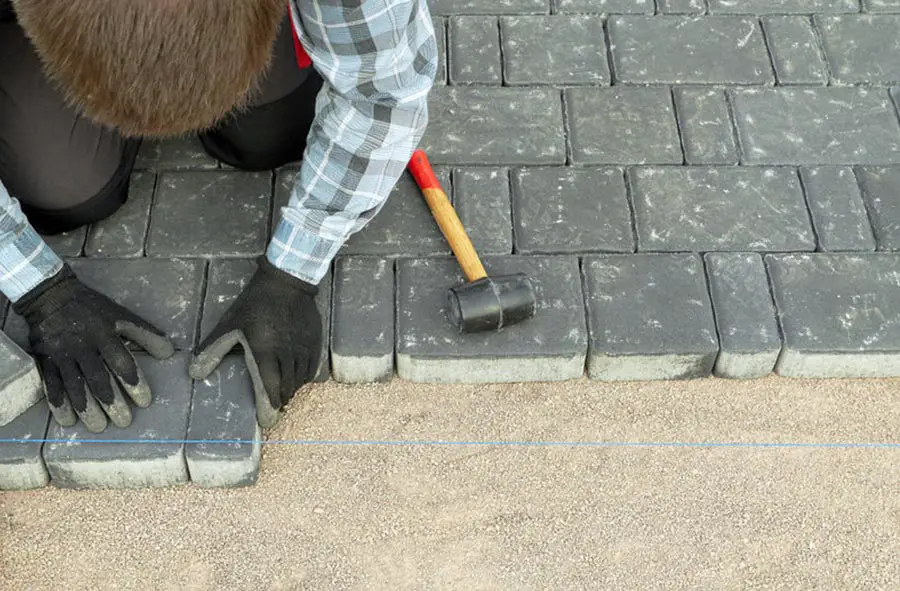
Installing Pavers
Another way of making the patio, driveway, or walkway attractive is by installing pavers. Most people choose to use interlocking ones that are simple to fix and require less labor.
Today, you can choose to hire a paver installation company for a great job. Different companies charge varying amounts. The results also differ depending on their level of experience, so pick them wisely. It’s better to ask for a recommendation and get many reviews before settling on one.
When you choose to use pavers, know that it’s a more labor-intensive project. It takes time to prepare paving stones for the final installation part. The installation process also takes several steps to complete.
The installers need to:
- Excavate
- Grade
- Compact the sub-base
- Install geotextile fiber
- Prepare and compact the base
- Pour sand
- Lay the paving stones
- Cut borders
- Prepare the bonding beam
- Compact the paving stones
- Seal the pavers in place
While the paving stone installation takes time, there’s no need to wait for curing. These stones are ready-made and can be used as soon as you complete the installation process.
Another advantage that makes pavers the right pick is adjustability. Unlike concrete, you can adjust pavers with ease. For example, if there’s a problem in a specific section, you take it out and modify it before completing the process.
In regards to installation costs, pavers need consideration in two forms.
Average Paver Materials Costs
There is a wide variety of choices when it comes to installing pavers. Below is an estimated pricing chart for the most common paver materials used in driveways and patios.
| Paver Material | Average Cost Per Square Foot |
|---|---|
| Clay Brick Pavers | $4 – $8 |
| Tumbled Concrete Brick Pavers | $3 – $5 |
| Stone Style Concrete Pavers | $5 – $7 |
Average Labor Costs
Installing pavers costs $6.25 to $10.90 per square foot.
That means, to install pavers on a 1000 square feet area, you need $4800 for the materials and $ 8575 for labor. But, pricing depends on the region and company you opt to hire for the job.
Maintaining Concrete and Pavers
Many people opt for concrete or pavers since both are easy to maintain. You don’t have to dig deeper into your pockets to clean and refurbish them now and then.
Maintaining Concrete Slab
As you consider if concrete is cheaper than pavers, keep in mind maintenance costs. The good news is you don’t need too much to maintain concrete.
This explains why this is a favorite of many people who want to create a driveway, walkway, or patio. However, concrete needs upgrading after some time because it can develop cracks and suffer some water damage.
Also, it tends to stain, which is why you might need to apply a preventive sealant coat on it. Then, after you notice problems on the concrete slabs, you can perform minimal repairs. You don’t have to replace the entire space.
Additionally, sweep and wash the concrete often when you want it to look attractive. When it has a sealant, this becomes easier, keeping it durable for a long time.
Maintaining Pavers
Pavers are simple to install and maintain. Many times you won’t need to perform lots of maintenance to keep them looking fantastic. Just make sure the installation process goes seamlessly to prevent problems soon.
The best way to keep your paves looking immaculate is by cleaning. Cleaning removes any materials or plants that can affect the surface. Hire a professional cleaning team that can keep the space looking great while maintaining the quality of the pavers.
Everything is prone to wear and tear. Pavers aren’t an exception. One significant issue many people face is settling. With time, you need to call back the installation team to replace any cracking or shifting pavers.
But, it’s simple to rectify using lifting to re-compact the base. Once this occurs, the repair person places a new layer of sand to hold the pavers better. Just be sure to replace all compromised pavers with new ones.
Repairing Costs for Concrete
While concrete is easy to maintain, at times, it might need repair. It can develop cracks that become worse over time. Avoid ignoring such problem areas since they tend to become worse over time.
Repair costs for concrete are distributed depending on the problem on the surface. For instance, you can make repairs for:
| Concrete Repair | Repair Cost |
|---|---|
| Filling Cracks | $10 to $150 per area, for example, patio |
| Uneven or Sunken Concrete Slabs | $5 to $15 per square foot |
| Leveling Using Slab Jacking | $2 to $5 per square foot |
These costs keep increasing if space has more work. That’s why it’s better to maintain it well and do repairs as soon as possible.
Also, take into consideration preventative measures like covering the patio and applying a sealant. This increases the longevity and strength of the concrete.
Repairing Costs for Pavers
Paving stones aren’t going to last forever. So while it’s a great way to transform the patio or driveway, at some point, you need to do some repairs.
Pavers tend to break or move, which makes the whole area unappealing. But you don’t have to remove the entire setup to mend this part. It’s better to repair it than wait when the whole space needs repair work.
Repairing pavers can cost you an average of $5 per square foot. However, pricing depends on how much work is necessary to make the whole space attractive.
Which is the Right Paving Material?
After considering concrete and pavers installation and repair costs, you can make a decision. While price is a huge determinant, also consider the aesthetics.
Remember, while concrete is cheaper to install, pavers are a complete project. Once you set them up, that’s the end of it. But, the same isn’t valid for concrete.
You have to think about how to make the concrete attractive. It can look dull and unappealing. So, you end up spending more to make it look better. Many people prefer to place rags, install a carpet, paint, or use other ideas to improve its aesthetics.
Home Valuation
Another consideration before you pick one of the two is the value of your property. While concrete is an excellent addition to your home, pavers add value to it. Therefore, potential buyers can pay more when you have pavers in place.
Consider this fact if you ever intend to resell your home in the future. That also means you have to keep maintaining and repairing the pavers. It speaks volumes about the aesthetics of the property.
Summing Up
Concrete and pavers are an excellent choice for your home. The two have numerous benefits that make them worth the extra effort. However, concrete is cheaper than pavers when considering the costs.
While concrete isn’t the most attractive on a patio, you can use other inexpensive ways to boost its appeal. For instance, a coat of paint can go a long way into transitioning your deck or walkway.
Keep in mind the two are long-lasting and versatile, but the extent of damage depends on the environment. Still, you can choose to use the two in your home for different areas. For instance, concrete for driveway and walkway while pavers go on the patio, thus minimizing costs.


